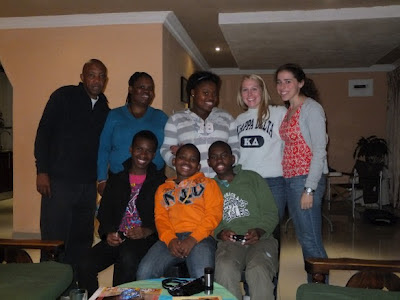One of the many reasons I chose to come on the CGE
Namibia program was for their great incorporation of experiential learning—the
largest components of which are the home stays with South African and Namibian
families. In total, we will complete three home stays, which will vary in
duration and style. We spent our first weekend in Southern Africa on our first
home stay with families from SOWETO (South Western Townships) in Johannesburg,
South Africa. Our second home stay will last 10 days and begin in about 2 weeks
time, when we will be living with a family in Windhoek, Namibia at night and
returning to the CGE house during the day for classes and internships. Our
third and final home stay will last one week and will be in the rural area
Khorixas in the Kunene region of Namibia, located West of Windhoek. We will be
taking language classes for this home stay because of the complexity of their
language and the non-existence of many English speakers in the area.
As mentioned above, this weekend we had an exciting time with our SOWETO
host families. Leah and I had the pleasure of living with the Makhothi family
of the Orlando East neighborhood. Five people, the same as my family, live in
the Makhothi household; Teboho (father), Mathapo (mother), Tshoanelo or ‘twani’
for short (daughter-18), Manneng (son-14), Ramokhele or ‘Ramu’ for short
(brother- 10). Their normal weekend activities consist of watching lots of
American and South African TV shows and visiting their extended family
throughout SOWETO. We participated in all of these activities, attended church
with the family and spent an afternoon walking around Orlando East with Twani’s
friends.
The thing about South African families is… they are just like American
families. I wasn’t very conscious of my misconceptions until I really
experienced a weekend in the Makhothi home. Teboho and Mathapo have the same
worries about their children and jobs as my parents have. The children work
just as hard at schoolwork as my siblings do. What this home stay taught me
more than anything is that we should be conscious of global problems because
they affect people who are just like ourselves, only living in a different part
of the world.
This clicked for me when we toured Orlando East
with Twani’s friends. The group of 19 and 20 yearold students (once again, same
as us) immediately dove into conversation comparing life in South Africa and
life in the United States. From pop culture to politics, unemployment rates to
health care, the situations in South Africa are almost identical to those
issues at the forefront of American minds. It amazes me that with such
similarities many Americans are still oblivious to other areas of the world. I
have appreciated not only learning about how related our two countries are, but
what the people of South Africa think of Americans. Their expressions were
generally positive with the caveat that we don’t look outside of our own
country enough. I completely agree with their assertions and though trying my
hardest to be otherwise, I have been culpable of those arrogant views in the
past.
On the last night of our stay the family gathered Leah and I to give us
traditional Sesotho names. My name is Lerota, meaning ‘Love’. This was a
significant moment for me because I understood that these home stay experiences
and my internship will teach me much deeper lessons than I could learn from any
book or lecture. I cannot wait to ask questions, embrace customs,
and delve into the traditions of my next two host families.


1 comment:
Thanks for information....
Post a Comment